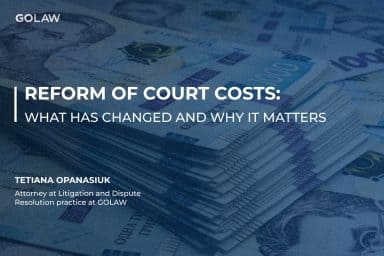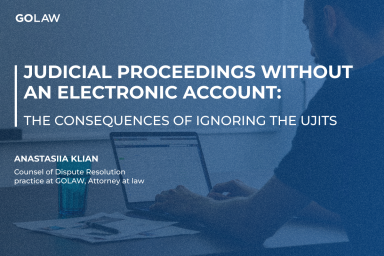Digest banking news: BANKING & FINANCE ALERT 25.09.2019
Contents
- The change of the mortgagor’s owner is not the basis for termination of a mortgage agreement
- Banks may not prevent the borrower and guarantor from travelling abroad until the debt to the bank is repaid
- PrivatBank lost the opportunity to foreclose hundreds of hectares of land because of invalidation of mortgage agreements
- Violation of the property valuation procedure is the ground for invalidation of a transaction involving a transfer of title to mortgaged property from the mortgagor to the bank
- Terms and Conditions for Provision of Banking Services are not a part of the loan agreement, unless those are signed by the borrower
- Conclusion of lease agreements in respect of the mortgaged property is possible only upon the mortgagee’s consent.
- The Grand Chamber of the Supreme Court clarified how the mortgagee may exercise the right to sell the mortgaged property, on its own behalf, to any third person under a sale and purchase agreement
- The Distressed Assets Management Regulation is approved
- Ukraine is going to use IBAN-standard bank accounts
The most important Banking & Finance news for your attention:
The change of the mortgagor’s owner is not the basis for termination of a mortgage agreement
In 2015, the National Bank of Ukraine granted PrivatBank a stabilization loan. In order to secure obligations under the loan, PJSC Erlan, the manufacturer of goods under the BIOLA trademark, mortgaged an integral property complex with a total value exceeding UAH 3 billion to the National Bank of Ukraine.
In 2016, PrivatBank became government property. PJSC Erlan decided that nationalization constituted a significant change in the circumstances, and therefore claimed for termination of the mortgage agreement. According to the court of first instance, the claimant would have succeed if it had changed the remedy a bit and requested the court to recognize the mortgage as terminated, rather than terminate the mortgage agreement itself. The court of appeal and then the Supreme Court changed that decision and found that PJSC Erlan’s demands were actually unsubstantiated: the nationalization of PrivatBank is the basis neither for termination of the mortgage nor for termination of the mortgage agreement.
Considering the court’s rationale, such a judgement should be given a wider interpretation: the change of the owner of the company, obligations of which are secured by mortgage, is not the basis for termination of a mortgage agreement. Otherwise, the banks would be exposed to unnecessary risk of losing the mortgage because of the change of the owner of the corporate debtor.
Banks may not prevent the borrower and guarantor from travelling abroad until the debt to the bank is repaid
As early as 2011, the bank obtained decisions of the court of first instance and the court of appeal, whereby the debtor and guarantor, who failed to perform their loan obligations, were prohibited to travel abroad until they repaid the debt. In June 2019, the Supreme Court published its ruling whereby those decisions were cancelled.
We would like to state that it is still possible to prohibit bad faith debtors to travel abroad, but through a different procedure. First, a court decision on recovery of funds from them should be obtained, and then it must be shown to the court that they evade performing this decision. By doing so, it should be emphasized that they are evading and not just unable to perform it. This is a rather complicated process, but still a real one. Based on this, the borrower may be prohibited to travel abroad until his/her debt to the bank is repaid.
PrivatBank lost the opportunity to foreclose hundreds of hectares of land because of invalidation of mortgage agreements
This is to remind that it is very important to carefully verify signatory’s power to sign the mortgage agreement. At one time, PrivatBank entered into two mortgage agreements in respect of 41 land plots of several hundred hectares. The agreements were signed by the mortgagor’s representative who acted under the power of attorney. According to mortgagor’s articles of association, all agreements must be signed both by its director and chief accountant, acting on behalf of the mortgagor. The signatory had a power of attorney from both of them. However, the articles of association provided for the director’s right to delegate his/her signatory powers to a third person, but there was no such instruction in respect of the chief accountant. Therefore, the Supreme Court decided that the signatory was not authorized to sign the mortgage agreement on behalf of the chief accountant and that is why invalidated the agreement.
For this very reason we remind of the importance of conducting due diligence (both legal and technical) of the mortgaged property.
Violation of the property valuation procedure is the ground for invalidation of a transaction involving a transfer of title to mortgaged property from the mortgagor to the bank
From a practical point of view, the fastest and the most convenient way to foreclose mortgaged property is to register mortgagee’s title to the mortgaged property. Of course, the mortgagor will try to find ways to challenge such transfer of title in court. In order to prevent the mortgagor from doing so, the mortgaged property valuation should be undertaken, inter alia, prior to the registration. It is also essential that such valuation is conducted in accordance with applicable legislation. The Supreme Court decided that violation of the National Standard No. 1 “General Principles of Valuation of Property and Property Rights” approved by the Resolution of the Cabinet of Ministers of Ukraine No. 1440 of 10 September 2003, may become the ground for cancellation of registration of bank’s title to the mortgaged property.
Terms and Conditions for Provision of Banking Services are not a part of the loan agreement, unless those are signed by the borrower
An individual entered into a loan agreement by signing the application on acceding the Terms and Conditions for Provision of Banking Services. The borrower stated in the application that he/she agreed that the Client Handbook, together with the Terms and Conditions for Provision of Banking Services and Tariff Rates, comprised an agreement for provision of banking services between the borrower and the bank, and that he/she had read the bank’s Terms and Conditions for Provision of Banking Services and Tariff Rates provided to his/her attention in written form. The borrower did not sign the Terms and Conditions for Provision of Banking Services and Tariff Rates themselves.
The bank filed a claim to recover the principal amount of the loan, interest, penalty, and a fine. To substantiate its claims, the bank provided an extract from the Credit Card Tariffs and an extract from the Terms and Conditions for Provision of Banking Services published on bank’s web-site. Those were the documents that contained terms of payment of loan interest and payment of penalty (fines).
The Grand Chamber of the Supreme Court granted the claim in respect of unpaid amount of the loan. The Court concluded that there was no evidence that it was exactly the extract from the Credit Card Tariffs and the extract from the Terms and Conditions for Provision of Banking Services that the borrower understood, and that those were exactly the documents the borrower had read and agreed to, signing the application on acceding the Terms and Conditions for Provision of Banking Services.
The Court stated, that the Terms and Conditions for Provision of Banking Services as were provided by the bank, given their variable nature, may not be deemed as part of a loan agreement, as well as any further terms and rules, or the right of the bank to use additional measures to increase the loan value, or expressly stated provision on expansion of rights and obligations of each of the parties, unless those are signed and agreed by the borrower, and also unless such terms are expressly specified, as is in our case – in borrower’s application directly signed by the latter, which is the only fact that may evidence that the borrower agreed to the terms offered by the bank and became a party to the agreement.
Conclusion of lease agreements in respect of the mortgaged property is possible only upon the mortgagee’s consent.
The Grand Chamber of the Supreme Court reminded that the mortgagor may transfer the mortgaged property for joint activity, for rent or lease only upon the mortgagee’s consent. If concluded without the mortgagee’s consent, any such transaction shall be deemed invalid. In case a lease agreement is invalidated, the mortgagee shall be entitled to demand the lessee to vacate the premises.
The Grand Chamber of the Supreme Court clarified how the mortgagee may exercise the right to sell the mortgaged property, on its own behalf, to any third person under a sale and purchase agreement
In July 2019, the decision of the Grand Chamber of the Supreme Court was published and stated that the sale of mortgaged property by the mortgagee to any purchaser could be implemented both through court and out-of-court procedures applied to satisfy the mortgagee’s claims.
At the same time, foreclosures of the mortgage by means of a court decision recognizing the mortgagee’s right to sell the mortgaged property on its behalf to any person under a sale and purchase agreement is possible only if certain conditions are met. In particular, such a way of granting mortgagee’s claims must not be specified as the out-of-court procedure in a mortgage agreement or in a mortgage clause on granting mortgagee’s claims, or in mortgage clause having the same legal effect as the mortgage agreement.
If the parties to the mortgage agreement agreed on granting the mortgagee’s claims this way in their mortgage agreement or in a mortgage clause, the claim for foreclosure of the mortgage property by selling the mortgaged property on behalf of the mortgagee, as provided for in Article 38 of the Law, shall be inappropriate remedy.
The Distressed Assets Management Regulation is approved
On 25 July 2019, the Resolution of the Board of the National Bank of Ukraine No. 97 of 18 July 2019 was enacted, by which the Distressed Assets Management Regulation was approved (hereinafter referred to as “the Regulation”).
The Regulation determines:
- the list of distressed assets (potentially distressedassets; non-performing assets; foreclosed property transferred into the ownership of the bank as a result of exercising mortgagee’s rights);
- components of the distressedassets management process (early response system; introduction of instruments to handle indebtedness under non-performing assets; foreclosed property management);
- requirements to organizational aspects of distressedassets management (development of a three-year strategy and operation plan intended to decrease the level and amount of such assets; establishment of a separate department to handle non-performing assets; monitoring the effectiveness of the process).
According to the information received from the National Bank, the introduction of the above requirements is aimed at creating an integrated distressed assets management process, subject to control by the bank’s board.
The specific attention in the Regulation is given to the process of management of foreclosed property. In particular, banks are required to develop a plan for sale of such property, internal banking procedures gor its maintenance, use and protection thereof, as well as conclude and maintain loss/damage insurance in respect of such property.
Ukraine is going to use IBAN-standard bank accounts
Starting from 5 August 2019, pursuant to the Resolution No.162 of 28 December 2018 and the Resolution No. 41 of 22 February 2019 of the National Bank of Ukraine, banks shall open new IBAN-standard accounts to their clients.
Starting from 1 November 2019, clients of all Ukrainian banks shall use IBAN-accounts when making bank transfers both in national and foreign currencies, in particular, when making international money transfers/payments. In other words, starting from 1 November 2019 all money transfers shall be made only by using IBAN-standard accounts.
At the same time, existing clients of the banks are not expected to undertake any actions to change numbers of their bank accounts to transfer to IBAN-standard; such changes shall be made automatically and shall not require any applications or execution of supplementary agreements.
Sign up to be aware
New achievements are inspired by information. GO further, don’t miss out GOLAW news and legal alerts
Our expertise
-
- Antitrust and Competition
- Banking and Finance
- Compliance, Corporate Governance and Risk Management
- Corporate and M&A
- Criminal and White Collar Defence
- Defense in Anti-corruption procedures and regulations
- Labor and Employment
- Natural Resources and Environment
- Government Relations (GR)
- Insolvency and Corporate Recovery
- Intellectual property
- International trade
- Legal support of business and private Сlients in Germany
- Litigation and dispute resolution
- Private clients
- Real Estate and Construction
- Energy and Natural Resources
- Restructuring, Claims and Recoveries
- Martial Law
- Tax and Customs
-
- Agribusiness
- Aviation
- Chemical industry
- Engineering, Construction and Building Materials
- Natural Resources and Environment
- Financial institutions
- IT and AI
- Industry and manufacturing
- Healthcare industries, Life sciences and Pharmaceuticals
- Media, Entertainment, Sports and Gambling
- Retail, FMCG and E-Commerce
- Transport and Logistics
We use cookies to improve performance of our website and your user experience.
Cookies policy
Cookies settings







